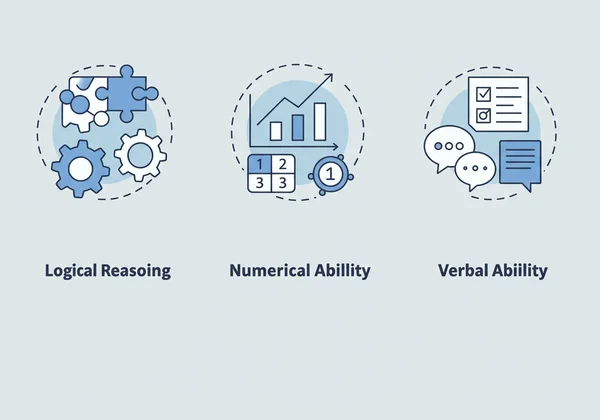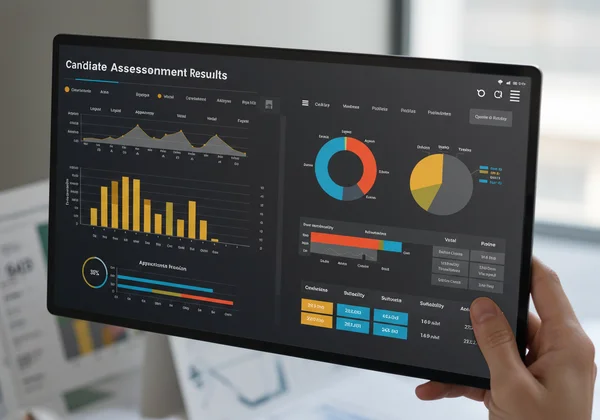Pre-Employment Aptitude Tests: Smarter Hiring Solutions
September 2, 2025 | By Donovan Blackwood
Navigating the modern talent landscape is tougher than ever. Traditional resumes and interviews often fall short, leading to costly mis-hires and a frustratingly slow recruitment cycle. Companies are increasingly seeking objective, data-driven insights to identify the best candidates and build a stronger, more resilient workforce. But how can an aptitude test help my career and my company's growth? The answer lies in using a powerful pre-employment aptitude test. These scientifically designed assessments move beyond subjective impressions to reveal a candidate's true potential.
A well-structured aptitude test for jobs provides a clear picture of a candidate's cognitive abilities, problem-solving skills, and potential for success in a specific role. By integrating these tools, you can transform your recruitment process from a game of chance into a strategic advantage. It's time to discover how to build a team destined for success. Ready to make smarter hiring decisions? You can explore assessment tools on our homepage.

The Untapped Power of Pre-Employment Aptitude Tests
Integrating a pre-employment aptitude test is more than just adding another step to your hiring process; it's a strategic investment in your company's future. These assessments offer a multi-faceted approach to talent acquisition, providing measurable returns and fostering a more equitable hiring environment. By leveraging data, you can move past gut feelings and build a team based on proven potential.
Reducing Hiring Costs and Boosting ROI
A bad hire can cost a company thousands, impacting everything from team morale to project deadlines. These costs extend beyond salary to include recruitment fees, training expenses, and lost productivity. The ROI in recruitment becomes significantly clearer when you consider the price of getting it wrong. Aptitude tests act as a powerful filter, reducing the risk of hiring candidates who are a poor fit for the role's demands. This leads to lower turnover rates and a more stable, productive workforce, ensuring your investment in new talent pays off. A small upfront investment in a quality assessment platform delivers long-term financial benefits.
Improving Candidate Quality and Job Fit Prediction
Resumes tell you what a candidate has done, but aptitude tests tell you what they can do. This predictive power is a game-changer for talent acquisition strategies. A high score on a logical reasoning or numerical ability test is a strong indicator of a candidate's ability to think critically and solve complex problems on the job. This focus on predictive validity ensures you are hiring individuals with the core competencies needed for success, not just those who write a compelling resume. By identifying high-potential candidates early, you build a stronger talent pipeline and improve overall job fit.
Ensuring Objective and Fair Candidate Screening
Unconscious bias is a persistent challenge in recruitment, often leading teams to overlook exceptional candidates from diverse backgrounds. A standardized assessment provides an objective benchmark for every applicant, creating a level playing field. This commitment to bias reduction not only strengthens your diversity and inclusion efforts but also protects your organization from potential legal challenges. By making data the cornerstone of your initial screening, you ensure that every candidate is evaluated based on their skills and potential, fostering a culture of fairness and meritocracy. You can improve hiring fairness with the right tools.

Essential Aptitude Tests for Your Recruitment Process
Not all roles are the same, and your recruitment process shouldn't rely on a one-size-fits-all assessment. A comprehensive strategy involves selecting the right mix of tests to evaluate the specific skills and abilities required for each position. From foundational cognitive skills to job-specific knowledge, the right combination of aptitude tests can provide a holistic view of a candidate's suitability.
Assessing Core Cognitive Abilities
Cognitive abilities are the bedrock of performance in almost any professional role. These tests measure how an individual processes information, learns new skills, and solves problems. Key assessments in this category include:
- Logical Reasoning Test: Evaluates a candidate's ability to identify patterns, analyze arguments, and draw sound conclusions from abstract information. This is critical for roles requiring strategic thinking and problem-solving.
- Numerical Ability Test: Measures proficiency in interpreting and working with numerical data, including charts, graphs, and tables. It is essential for finance, analytics, and management positions.
- Verbal Ability Test: Assesses a candidate's ability to understand, analyze, and interpret written information, which is vital for communication-heavy roles in marketing, sales, and HR.
These foundational tests provide a reliable baseline of a candidate's intellectual horsepower. Explore a variety of cognitive aptitude tests to see what fits your needs.

Evaluating Specific Job-Related Skills
For many positions, specialized knowledge is non-negotiable. A general cognitive test might not capture a candidate's proficiency in a technical field. This is where job-specific assessments become invaluable. A technical skills assessment can validate a software developer's coding knowledge or an engineer's understanding of complex systems. Similarly, a mechanical aptitude test is crucial for hiring in manufacturing, maintenance, and skilled trades, as it measures a candidate's grasp of physical principles and mechanical concepts. Using these targeted tests ensures that your new hire can hit the ground running from day one.
Understanding Behavioral Fit with Personality & SJTs
Technical skills get you in the door, but soft skills determine long-term success. How an employee collaborates, handles stress, and aligns with company values is critical for culture fit and team cohesion. This is where behavioral assessments come in:
- Personality Tests: These evaluations map a candidate's inherent traits, such as conscientiousness, extraversion, and agreeableness, helping you understand their work style and how they might interact with a team.
- Situational Judgement Tests (SJTs): SJTs present candidates with realistic workplace scenarios and ask them to choose the most effective response. This provides direct insight into their problem-solving, communication, and decision-making skills in a professional context.
A comprehensive soft skills assessment helps you build a team that is not only competent but also collaborative and aligned with your organizational culture.
Implementing Hiring Assessment Tools Effectively
Choosing the right hiring assessment tools is only half the battle. To truly maximize their impact, you must integrate them strategically into your existing workflow and use the results to make informed, data-driven decisions. Effective implementation ensures a positive candidate experience while providing your hiring managers with the actionable insights they need.
Seamless Integration into Your Hiring Workflow
The timing and placement of your assessments are crucial. Introducing an aptitude test too early might deter qualified candidates, while using it too late diminishes its value as a screening tool. A common best practice is to administer tests after the initial resume screen but before the in-depth interview stage. This approach optimizes the assessment workflow by ensuring that you only invest valuable interview time in candidates who have already demonstrated the necessary core abilities. This focus on candidate journey optimization makes the process more efficient for both your team and the applicants.
Interpreting Results for Data-Driven Decisions
Raw scores are just numbers; the real value lies in their interpretation. A robust platform should provide detailed report analysis that goes beyond a simple pass/fail metric. These reports, often powered by AI, offer insights into a candidate's specific strengths and potential areas for development. By establishing clear benchmark setting criteria based on the requirements of the role, you can objectively compare candidates and identify top performers. These insights empower hiring managers to ask more targeted questions during interviews, leading to more productive conversations and better hiring outcomes.

Legal Compliance and Ethical Best Practices
Using assessments in hiring comes with a responsibility to ensure fairness and legal defensibility. It is essential to use tools that have proven test validity, meaning the test accurately measures what it claims to measure and is relevant to job performance. Adhering to fair employment practices means applying assessments consistently to all candidates and avoiding any form of adverse impact on protected groups. Partnering with a reputable aptitude test provider ensures your assessments are developed according to psychometric science and ethical guidelines, building trust and safeguarding your organization. Start building a better hiring process today.
Revolutionize Your Hiring with Strategic Aptitude Testing
Moving beyond traditional hiring methods is no longer an option—it's a necessity for competitive advantage. Pre-employment aptitude tests offer a powerful, data-driven solution to identify top talent, reduce hiring costs, and build a more effective workforce. By implementing a strategic assessment process, you can ensure objectivity, predict job success, and ultimately drive better business outcomes.
It's time to stop guessing and start hiring with confidence. Empower your team with the insights needed to make smarter, faster, and fairer decisions. Discover smarter hiring and explore the comprehensive suite of scientifically validated assessments available on our platform.
Frequently Asked Questions for HR About Aptitude Tests
What exactly do pre-employment aptitude tests measure?
A pre-employment aptitude test is designed to measure a candidate's potential to succeed in a specific role. Unlike achievement tests that assess what someone already knows, aptitude tests evaluate innate abilities and cognitive skills. They typically cover areas like logical reasoning, numerical ability, problem-solving, and verbal comprehension, providing a standardized way to predict future job performance. You can explore our assessments to see the different types available.
How do aptitude tests benefit our company's hiring process?
Aptitude tests introduce objectivity and data into the hiring process, which directly benefits your company. They help reduce unconscious bias, leading to fairer evaluations and a more diverse workforce. Furthermore, they are highly effective at predicting job performance, which lowers the risk of costly mis-hires and reduces employee turnover. This makes your recruitment cycle more efficient and cost-effective.
Are pre-employment aptitude tests fair and legally compliant?
Yes, when designed and implemented correctly. Reputable tests are developed based on rigorous psychometric principles to ensure they are valid and reliable. To maintain legal compliance, it's crucial to use tests that are directly relevant to the job's requirements and to apply them consistently to all candidates. This commitment to fairness helps create a defensible and ethical hiring process. Our platform prioritizes these standards.
Which types of roles benefit most from aptitude testing?
While nearly any role can benefit, aptitude testing is especially valuable for positions that require strong problem-solving, critical thinking, and data analysis skills. This includes roles in finance, engineering, management, consulting, technology, and analytics. They are also highly effective for screening large volumes of applicants for entry-level or graduate positions, helping to identify high-potential candidates efficiently.
Can candidates "study" or "fake" their results on these tests?
Aptitude tests measure inherent cognitive abilities rather than learned knowledge, making them difficult to "cram" for in the traditional sense. While practice can familiarize a candidate with the format, it's unlikely to significantly alter their underlying abilities. Behavioral or personality tests often include measures to detect inconsistent or socially desirable answers, making them difficult to fake. The goal is to see a candidate's true potential, and well-designed tests are built to capture that. To find reliable tools, try our free test and see the difference.